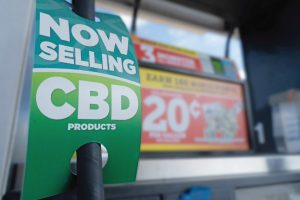
A longer version of this story appears in the September issue of MJBizMagazine.
The future of cannabis retail is technologically exciting—think ubiquitous online ordering and sophisticated consumer analysis—and fraught with potential challenges.
That’s the assessment of Rick Maturo, former associate director of cannabis client services at Nielsen, the national audience and consumer analytics company based in Chicago.
New technology could amplify business opportunities for hemp and marijuana retail. And in order to prepare for mainstream competition, today’s cannabis players must be technologically savvy.
Here are four things today’s hemp and CBD retailers should know about tomorrow.
Online ordering
Ordering hemp products like CBD online has been possible for several years, but now it’s becoming universal. Most retailers have their menus online, meaning even in-person consumers can educate themselves about the products ahead of store visits.
“In terms of technology, there’s been a big shift away from requiring people to touch things or interact as much face to face,” said Bethany Gomez, managing director of the Brightfield Group, a cannabis-focused consumer and data analyses organization based in Chicago.
“We see a lot more dispensary-level innovation just in terms of ‘click and collect’ or … purchase through the apps,” she said.
As part of that trend, Gomez says cannabis retail stores are employing more vending machines and kiosks.
Maturo agrees the retail future will be more digital. He noted, however, that there will be a difference between how veteran consumers engage with stores online versus newer consumers.
“People who have more familiarity with the cannabis category are more likely to use online ordering (or) delivery services than people who are new or canna-curious,’” Maturo told MJBizMagazine.
“For more experienced users, it’s really more about, ‘I know what I want, I know what I’m looking for.’ … It’s all about efficiency.”
Subscription CBD
The cannabis industry could reach a point where repeat customers set up recurring deliveries of their favorite products, much like a monthly subscription.
Less frequent consumers, however, are more apt to visit a retailer to answer the questions that menus cannot.
“There are still folks who like the idea of going into a dispensary and having someone they can ask those questions and be able to see and feel the products,” Maturo said.
“The end goal is … eventually, they’re going to become a more knowledgeable and more active consumer (and) don’t necessarily feel the need to go into the store.”
Consumer analytics
A growing number of software platforms are aiming to help retailers take the guesswork out of understanding their consumers.
Retailers currently using these platforms already can text or email promotions based on individual consumers’ past buying habits—and more personal recommendations could become the norm within a few years.
“They’re offering curated selections, curated promotions, to specific users based on their past behaviors,” Maturo said, adding that he sees these developments with a cannabis retailer he visits in Illinois.
“I’m seeing a lot more promotions that are specific to the types of products I want. And I’m getting hit with messaging that is directing me toward new products that are similar to other products that I’ve purchased,” Maturo explained.
“We’re seeing that development scale pretty fast in the cannabis industry—I’d say it’s arguably much faster than what we’ve seen in traditional industry.”
He predicted that in the next four to five years, brick-and-mortar stores will be able to target consumers who make physical visits to their stores with individualized promotions and messaging. For example, a consumer could scan an ID at the front door, triggering in-store menus to feature products and promotions that the shopper is most likely to want.
This is more feasible with a store with light foot traffic, Maturo noted.
“The whole store could change when a certain customer walks in, depending on their preferences,” Maturo said, explaining that wall colors, music and menu boards could all change to cater to an individual shopper. “You make it very idiosyncratic with the customers who are inside the store at any given time.”
Gomez agrees that consumers want to have solid product recommendations and a smooth retail transaction. Technologies that streamline the product-exploration process are helpful, she said, but some systems that live on an iPad can provide that level of education as well, without the need for bells and whistles.
Convenience is king
Convenience stores such as 7-Eleven and chain drugstores such as CVS are having early success with CBD products.
Drugstores are accustomed to dealing with highly regulated products, and convenience stores check more IDs per day than any other retailer, which is an advantage from a legality standpoint, Maturo said.
He notes that convenience stores were among the first to start offering CBD products such as beverages, topicals and tinctures, though he added that the coronavirus pandemic pushed many CBD users to shop online, creating a dip in convenience store sales.
“There is also a lot of overlap between convenience store shoppers and cannabis users,” he added.
Omar Sacirbey is a reporter for MJBizMagazine and Marijuana Business Daily. You can reach him at [email protected].

